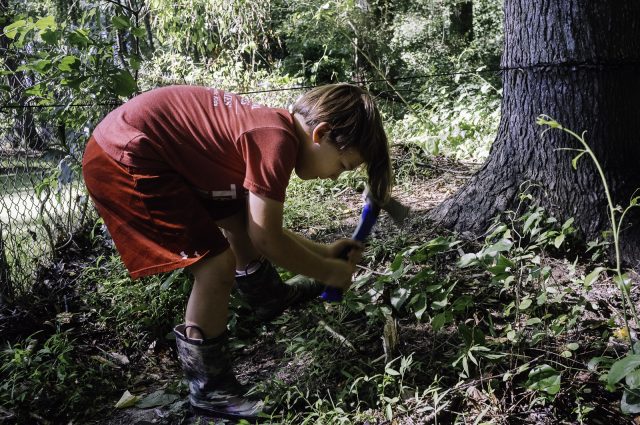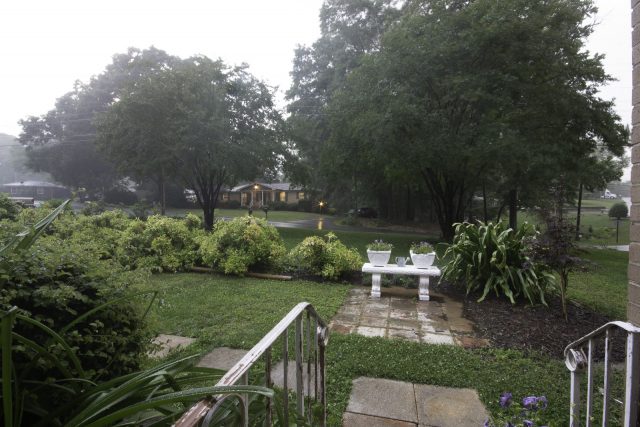Another Rainy Day
We are sick of the rain. Simply sick of it. Every day for the last — how long has it even been? A week? Day in, day out, at some point during every single day, it rains. The air is heavy and moist, and it’s just not a pleasant experience — though it could be worse with all the flooding others are getting.
Today, we finally got outside in the afternoon. It was muggy but sunny. What else could we do but head back to our new fort location and work on it. Doing what exactly? Well, chopping things down.
Some things were much easier to chop than others. The mushy, termite-infested stump we discovered to be such a few months back when I gave what appeared to be a 10-foot stump a push and broke it off about two feet from the ground — that stump is quite solid a little further down.
Of course, the sprinkles that filled the morning and early afternoon and kept us inside came back with friends in the early evening just as we got back from our walk.
I took a few experimental shots — long exposure. Long exposure for daylight pictures. The above image was about 15 seconds. I don’t know what I was hoping to accomplish — get streaks of rain in the image, I guess — but it just turned out to be a bland shot of our front yard.
Later in the evening, we tried it inside. When I explained what a long exposure inside would do, the kids thought it was a very unique idea. “Make us ghosts!”
Done.
Dickensian Commonalities
I’ve been listening to Dickens’s Dombey and Son on Spotify this week — the first time in close to 20 years that I’ve read a new (to me) Dickens book. One of the things that I’m enjoying most is the simple pleasure of discovering new examples of Dickensian acerbic wit, like this:
After the lapse of some minutes, which appeared an immense time to little Paul Dombey on the table, Doctor Blimber came back. The Doctor’s walk was stately, and calculated to impress the juvenile mind with solemn feelings. It was a sort of march; but when the Doctor put out his right foot, he gravely turned upon his axis, with a semi-circular sweep towards the left; and when he put out his left foot, he turned in the same manner towards the right. So that he seemed, at every stride he took, to look about him as though he were saying, “Can anybody have the goodness to indicate any subject, in any direction, on which I am uninformed? I rather think not.”
Add to that a classic Dickensian name — can there be a more inept educator than someone named Doctor Blimber? — and it just brought out of me a loud laugh.
I’m discovering too that this is another example of Dickensian exposes on the Victorian view of children, which often enough bordered on abuse. And as always, Dickens does it with a flourish of humor that still has enough darkness around the edges to make the reader shudder just a little at what the child must be going through.
Poor Paul Dombey, at six, has been deposited at a boarding school in an effort to make up lost time in his education due to his generally ill condition. The headmaster, Dr. Blimber of above, is known for instilling in the children a thorough knowledge of Greek and Latin grammar and little else and of assuming that he’s aptly prepared his pupils for the challenges of life. Paul, on his second day of school, is given a pile of books to read and master. He does the best he can with them:
‘Now, Dombey,’ said Miss Blimber. ‘How have you got on with those books?’
They comprised a little English, and a deal of Latin—names of things, declensions of articles and substantives, exercises thereon, and preliminary rules—a trifle of orthography, a glance at ancient history, a wink or two at modern ditto, a few tables, two or three weights and measures, and a little general information. When poor Paul had spelt out number two, he found he had no idea of number one; fragments whereof afterwards obtruded themselves into number three, which slided into number four, which grafted itself on to number two. So that whether twenty Romuluses made a Remus, or hic haec hoc was troy weight, or a verb always agreed with an ancient Briton, or three times four was Taurus a bull, were open questions with him.
‘Oh, Dombey, Dombey!’ said Miss Blimber, ‘this is very shocking.’
‘If you please,’ said Paul, ‘I think if I might sometimes talk a little to old Glubb, I should be able to do better.’
‘Nonsense, Dombey,’ said Miss Blimber. ‘I couldn’t hear of it. This is not the place for Glubbs of any kind. You must take the books down, I suppose, Dombey, one by one, and perfect yourself in the day’s instalment of subject A, before you turn at all to subject B. I am sorry to say, Dombey, that your education appears to have been very much neglected.’
‘So Papa says,’ returned Paul; ‘but I told you—I have been a weak child. Florence knows I have. So does Wickam.’
‘Who is Wickam?’ asked Miss Blimber.
‘She has been my nurse,’ Paul answered.
‘I must beg you not to mention Wickam to me, then,’ said Miss Blimber. ‘I couldn’t allow it’.
‘You asked me who she was,’ said Paul.
Bear in mind that Paul at this point is six years old. “How is your Latin grammar?” asks the headmaster. “I am sorry to say, Dombey, that your education appears to have been very much neglected,” declares his tutor, the headmaster’s daughter. Just what were they expecting of a six-year-old boy?




0 Comments